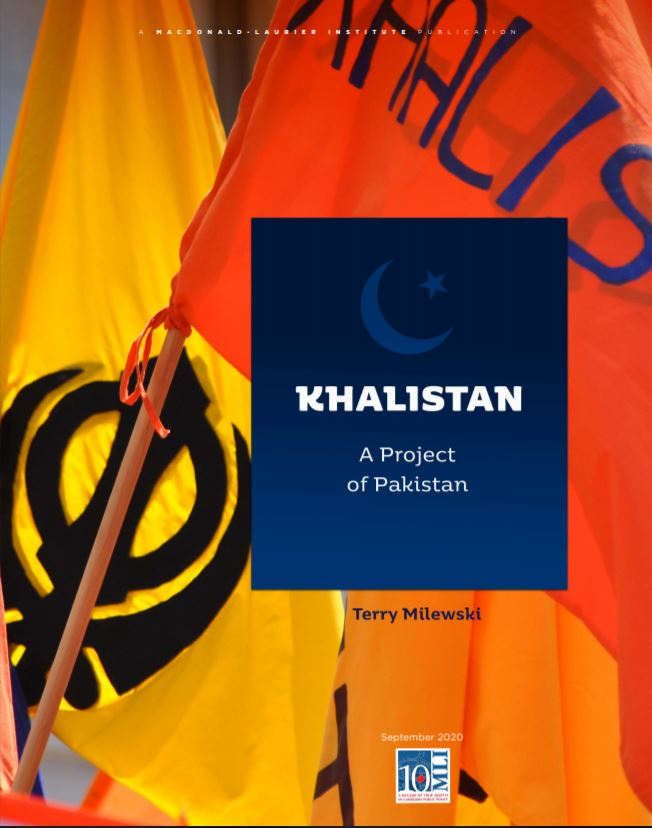
Veteran Canadian journalist Terry Milewski's new paper Khalistan: A Project of Pakistan, shines the spotlight, once again, on the body of evidence of Pakistan's role in fomenting separatist movement in India's Punjab state.
Milewski, who has decades-long experience as a Canadian Broadcasting Corporation journalist, underscores that the Sikh separatist 'Khalistan' movement, which has found its strongest support base in Canada, is a threat to the national security of both Canada and India.
The Khalistan separatist movement, which was a festering wound in Punjab in the 1980s, led to the death of more than 10,000 people. The worst ever terror attack on Canada was perpetrated by this terror group when it bombed Air India Flight 182 flying from Toronto to London on June 23, 1985. All 329 people aboard, most of them Canadians, died in the bombing.
Milewski calls the Khalistan movement "a geopolitical project nurtured by Pakistan." It's surprising, he says, that the world hasn't given enough attention to the Pakistani role in using Canada as a springboard for terrorism against India.
Canada's Worst Terror Attack
"It's surprising that it's a surprise. Seems lots of people didn't know how Pakistani the Khalistani movement is. But where else could a fugitive Air India bomber, Talwinder Parmar, pose openly at a gun bazaar if not in Pakistan, near the Afghan border?," Milewski tweeted, announcing the publication of the book.
Parmar, the kingpin behind the Kanishka [Air India Flight 182] bombing, was initially in the crosshairs of Canadian police, but later charges against him were dropped. He was killed in a gunfight with Punjab police in 1992.
'Bleed India by a Thousand Cuts'
India has maintained that the origins of the Punjab militancy in the 1970s lay in Pakistani deep state's agenda to bleed India by a thousand cuts. Sikh extremist leader Jarnail Singh Bhindranwale put together an armed militancy in Punjab with the support of Pakistani spy agency Inter-Services Intelligence (ISI) and waged a bloody campaign against the Indian state.
Pakistani spy chiefs like Hamid Gul had openly supported the Khalistan movement in its heyday. It was an open secret that prominent Khalistan extremists were given shelter in Pakistan. For the Pakistani establishment, Kashmir separatism and Khalistan movement were inalienable -- both fed each other and came handy in inflicting wounds on India from two flanks.
The Khalistan movement lost steam after Indian forces killed Bhindranwale, who had turned the holy shrine of the Sikhs in Amritsar into a war dungeon. Punjab went on to embrace its golden decades henceforth, transforming itself into one of the most prosperous states in India.
However, Canada seems to have been oblivious of the danger stemming from Pakistan's overt support of the Khalistan movement. "Pakistan's support of Khalistani extremists entails leveraging extremists based in Canada, including supporters with ties to terrorism," Milewski says in the book.
Sikh Separatism Paradox
Milewski points out the paradox of the Khalistan movement getting nearly zero support in the Sikh home state of Punjab while gaining currency in Canada. The country remains a safe haven for the supporters of Khalistan independence who radicalize youth, procure weapons and plan attacks against India.
When Canada placed two Canadian Sikhs associated with the Khalistan movement -- Bhagat Singh Brar and Parvkar Singh Dulai -- in a no-fly list in 2018, the issue of Khalistan's nexus with Pakistan was out in the open once again. Canada's security agencies said Brar was accused of working with Pakistan's ISI to launch an attack in India in 2017.
"The service [Canadian Security Intelligence Service] believes that Brar is a Canada-based Khalistani extremist who has been engaged in [redacted] terrorist-related activities, particularly in fundraising in support of terrorist attacks overseas," according to a secret case brief report," a secret Canadian case brief report said, the Global News reported.
Canadian security agencies describe Brar and Dulai as vocal supporters of Khalistan who worked in tandem with the Inter-Services Intelligence. Brar visited Pakistan and collaborated with Gurjeet Singh Cheema in order to launch an attack in India, it was revealed. He raised money in Pakistan to fund anti-India activities, the agencies said.
"It's clear who's really driving the Khalistan bus: Pakistan," says Milewski in the new book, which was published by the Macdonaldlaurier Institute.









